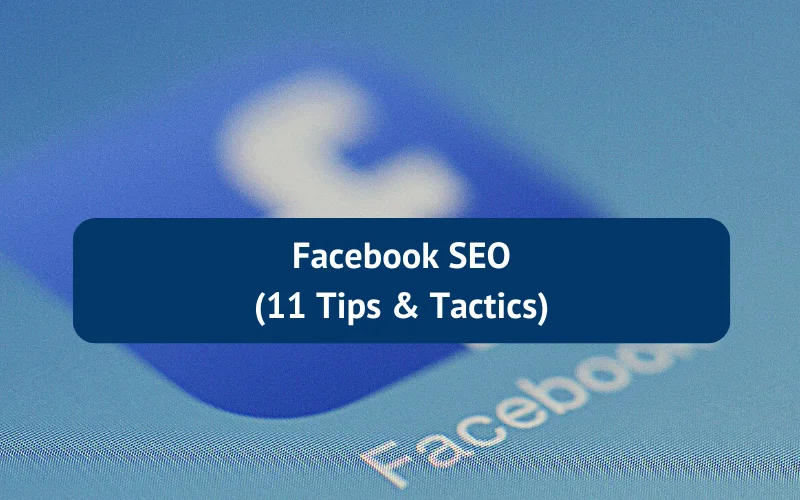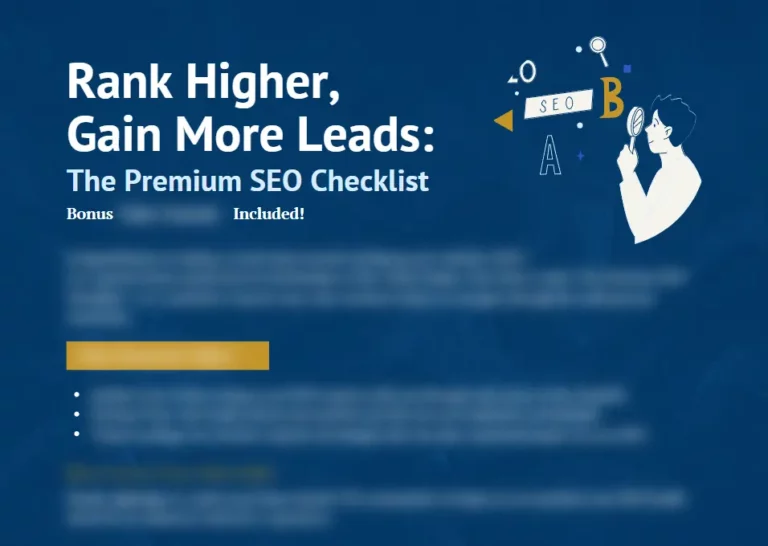In the age of digital revolution, Facebook isn’t just a social media platform; it’s a business empire.
With over 2.8 billion active users, it offers an unparalleled opportunity to connect with potential customers. For businesses, the goal is simple: to be seen and heard.
How do they achieve it?
Enter Facebook SEO (Search Engine Optimization): the art of making your Facebook content discoverable both within the platform and in search engine results.
Buckle up as we delve into the world of Facebook SEO, from perfecting your page name to leveraging AI chatbots for user engagement.
TL:DR
- Optimize your Facebook page with keyword-rich content, backlinks from reputable websites, and engaging with followers to improve SEO.
- Utilize AI chatbots for enhanced user experience and monitor competitors’ strategies to stay ahead of the game.
1. Choosing the Perfect Facebook Page Name
Choosing the perfect Facebook page name might seem as simple as just using your business name. But it’s more than that.
It’s about being mindful of the words that best represent your business and set you apart from the competition.
A single word or a specific brand name that is memorable and accurately reflects your business is more likely to rank higher in search results and make your web page stand out.
When crafting your Facebook page name, consistency, clarity, brevity, longevity, and accuracy are key. Avoid the temptation to stuff your page name with keywords.
Instead, focus on creating a name that is easy to spell and pronounce, and exclude any superfluous words.
After all, a memorable name that resonates with your audience is far more impactful than a keyword-stuffed moniker that’s forgettable.
2. Claim Your Custom Vanity URL
A Facebook vanity URL, or custom username, is more than just a sleek, professional look.
It’s an essential component of your Facebook SEO strategy that can significantly enhance your brand recognition and visibility.
An ideal URL for your Facebook business page should be descriptive and concise, and it should accurately reflect your company’s name.
Claiming a vanity URL not only makes your page easier to find on Facebook, but it also improves your page’s visibility on search engines.
This unique URL not only lends credibility to your business, but also contributes to your overall SEO strategy, increasing the likelihood of your page appearing in relevant search results.
3. Strategically Place Keywords on Your Facebook Page
Just as keywords are crucial for traditional SEO, they’re equally important for Facebook SEO.
SEO techniques like strategic keyword placement in your Facebook page’s “About” section, posts, and photo descriptions can significantly improve your on-site SEO and search engine rankings.
Tools like Google Keyword Planner and KWFinder can be used for keyword research for Facebook SEO.
The key is to incorporate relevant keywords throughout your page, including in your page name, description, and every post you publish.
But remember, while keywords are crucial, they should never compromise the quality or relevance of your content.
Avoid keyword stuffing and instead aim to provide valuable content that resonates with your audience and aligns with your overall Facebook SEO strategy.
4. Enhance Local SEO with Accurate Contact Information
Local SEO is an essential aspect of your overall SEO strategy, especially for businesses with a physical location or those targeting a specific geographical area.
Accurate and consistent contact information on your Facebook page – including your business address, phone number, and business hours – can significantly enhance your local SEO.
Ensuring the accuracy of your contact information helps search engines verify your business location and provides customers with accurate information about businesses in their vicinity.
Regularly check and update your contact information across all platforms to ensure consistency and accuracy.
Inconsistent or inaccurate information can harm your local SEO and lead to confusion for customers.
5. Boost Your Facebook Page’s SEO through Backlinks
Backlinks, or incoming links to your Facebook page from other websites, play a crucial role in enhancing your Facebook SEO ranking.
They are used by search engines as a metric of credibility, meaning the more high-quality backlinks your Facebook page has, the more likely it is to rank highly in search results.
One way to increase backlinks to your Facebook page is by including them in your website, especially within blog posts.
You can also share your Facebook page link with other companies and brands you collaborate with.
Remember, incorporating backlinks from reputable websites can enhance your Facebook page’s trustworthiness and search engine optimization.
6. Optimize Facebook Posts for Better Visibility
Your Facebook posts are not just a way to engage with your audience; they are also an opportunity to improve your Facebook SEO.
By incorporating relevant keywords, posting at optimal times, and engaging with your audience, you can boost your visibility and search engine rankings.
High-quality visuals and optimal timing for posts can significantly enhance your engagement rate.
But remember, engagement doesn’t end with posting content.
It’s equally important to interact with your audience, respond to comments, and set up polls.
The more engagement your posts receive, the higher they will rank in your followers. News Feeds, improving your overall Facebook SEO.
7. Leverage Facebook Notes for Improved SEO
Facebook Notes, a feature that allows users to compose and distribute lengthy posts similar to blog posts, present a unique opportunity to further optimize your Facebook SEO.
By incorporating keywords, images, and engaging content in your notes, you can improve your page’s SEO and drive more organic traffic to your page.
To maximize the potential of Facebook Notes for SEO, include relevant keywords in the note’s text, add relevant images, and create engaging content that encourages users to share it.
Also, linking to other pages on your website or other social media accounts can help to build backlinks.
8. Engage with Your Audience to Improve Reputation Management
Engaging with your audience is crucial for managing your online reputation.
Responding promptly to comments and reviews, posing questions to stimulate discussion, and setting up polls to gather feedback are all ways to engage with your audience.
This not only helps to build relationships and boost brand loyalty, but also aids in outranking negative reviews and optimizing your Facebook page’s SEO.
Consistent and genuine engagement shows your audience that you value their input and are attentive to their needs and concerns.
This can result in positive reviews and recommendations, which can significantly improve your online reputation and Facebook SEO.
9. Utilize AI Facebook Messenger Chatbots for Enhanced User Experience
Artificial Intelligence (AI) is revolutionizing the way businesses interact with their customers, and Facebook Messenger chatbots are leading the charge.
These automated customer service agents can interact with customers, capture user information, and offer personalized experiences.
By automating customer interactions, you can offer a tailored experience, lighten the load on your customer service team, and boost sales.
Plus, handling FAQs and straightforward matters via chatbots can save time and resources, allowing your team to focus on more complex issues.
And, of course, a better user experience translates to improved Facebook SEO.
10. Monitor Competitors and Learn from Their Strategies
Keeping an eye on your competitors isn’t about copying their strategies; it’s about learning from their successes and failures to improve your own approach.
By monitoring their activities, content, and strategies, you can identify potential areas of improvement in your own approach and maintain a competitive edge.
Tools such as TrackMaven, Fanpage Karma, and Porter can help you monitor your competitors on Facebook.
Additionally, the Facebook Insights tab allows you to add competitors’ pages to your watch list and view pertinent information regarding them.
By analyzing their highest-performing content and completing a SWOT analysis, you can refine your own strategy and stay ahead of the curve.
11. Utilize Facebook Tools to Optimize Your Page
Facebook offers a variety of tools and features that can help optimize your page and improve your overall SEO strategy.
Facebook Insights, for instance, provides valuable data regarding the performance of your page, including likes, shares, comments, and audience demographics.
The Facebook Page Optimization Checklist is another useful tool that includes tasks such as setting up a custom URL, adding relevant keywords to your page, and verifying your contact information.
By utilizing these tools and incorporating SEO tactics such as keyword usage, audience engagement, and leveraging Facebook Notes, you can enhance your page’s visibility and reach a wider audience.
What is Facebook SEO?
SEO on Facebook aims to increase the content’s reach, discoverability and visibility through Facebook search engine optimization.
It involves optimizing the posts in order to maximize their potential. It involves using specific strategies, such as keyword optimization, backlinking, and audience engagement, to improve your page’s visibility both within Facebook and in search engine results.
By integrating Facebook SEO into your business strategy, you can expand your fan base, develop relationships with followers, and increase visibility on other search engine results pages.
In the current digital landscape, establishing a reliable social media presence is essential for businesses, and Facebook SEO plays a crucial role in this.
Is Facebook SEO Important?
Yes, Facebook SEO is important.
With billions of users, Facebook is a platform where businesses can’t afford to be invisible.
Facebook SEO helps optimize your page to be found when people search for relevant keywords, thus increasing the quality and quantity of traffic to your page.
Facebook SEO not only enhances your online presence, but also generates organic traffic and raises brand awareness on the platform.
Amplify Your Reach with Facebook SEO
Facebook SEO is an essential part of any business’s digital marketing strategy.
By working with an SEO agency, businesses can optimize their Facebook SEO efforts, as these agencies have the specialized knowledge and resources to ensure that the page is optimized for maximum exposure and reach.
Facebook SEO is not a one-time effort, but a continuous process that requires regular monitoring and optimization.
With the right strategies and tools, you can effectively optimize your Facebook page and stay ahead in the competitive digital landscape.
Learn how to do SEO for popular platforms:
Frequently Asked Questions
Can you do SEO on Facebook?
Yes, SEO can be used on Facebook.
You can boost your search rankings by strategically adding SEO keywords to the captions of the photos, videos and articles you share.
What does SEO mean on Facebook?
Search engine optimization (SEO) on Facebook involves understanding how search engines categorize content on the social platform and using these principles to help design and create content for your website.
This is known as Social SEO, a relatively new practice that seeks to rank higher on search engine results pages (SERPs) within Facebook.
How to do SEO for Facebook Marketplace?
To improve your SEO for Facebook Marketplace, use 3 to 5 relevant keywords in your title and description.
Analyze which listings occupy the top spots and which land at the bottom when you enter those keywords into the search bar.
Include these keywords in your title and description to increase your chances of appearing in the top spots.
Make sure to use them in a natural way that reads well and makes sense.
Here’s a guide on how to do marketplace SEO.
How can AI Facebook Messenger Chatbots enhance user experience?
AI Facebook Messenger Chatbots can automate customer interactions, capture user information and provide personalized experiences, enhancing user experience and page SEO.
These chatbots can be used to answer customer inquiries, provide product information, and even process orders.
They can also be used to collect user data, such as email addresses, to build a customer database.




